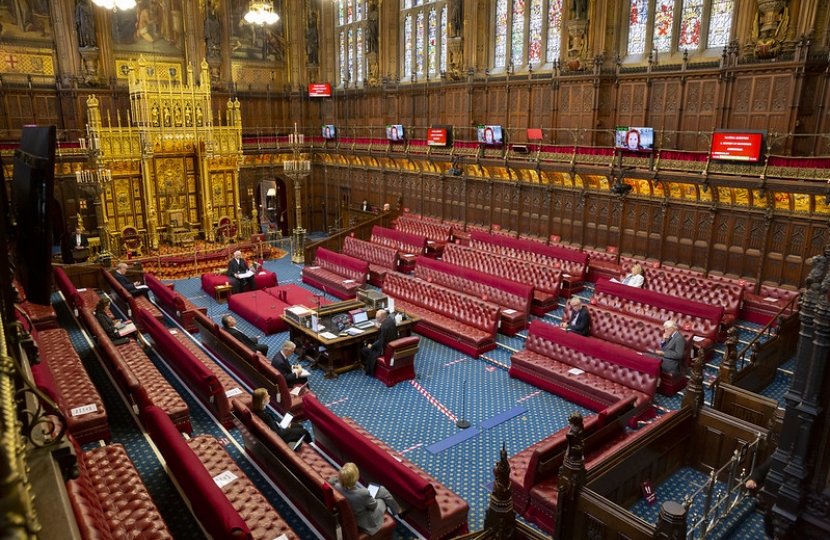
I wholeheartedly share the concerns of constituents about the use of storm overflows and, as a passionate conservationist, need no convincing as to the importance of ensuring clean and healthy rivers. That is why I have for some time been leading the campaign to tackle the use of storm overflows.
We have made significant progress this year in particular, and I will explain more about this shortly. However, I will begin by commenting on Lords’ Amendment 45 to the Environment Bill, which was voted on last night, and about which a number of constituents have contacted me.
The Government has inserted a range of amendments to the Environment Bill to address the concerns I and other colleagues have raised about the use of storm overflows. I was pleased to vote in support of Amendment (a) to Lords Amendment 45, which passed by a margin of 265 votes for to 202 votes against.
Concerns have been raised that section 141A, tabled by the Duke of Wellington in the House of Lords, was removed from Amendment 45. Section 141A sought to place a new duty on sewerage undertakers in England and Wales to demonstrate progressive reductions in the harm caused by discharges of untreated sewage.
This all sounds admirable, and indeed is something I support in principle. But the trouble is that the Duke’s amendment came with no plan as to how this can be delivered and no impact assessment whatsoever.
Some might argue that a plan is not essential, that one can be formulated afterwards. I would be sympathetic to this point of view if we were talking about a simple, inexpensive endeavour. But in eliminating storm overflows, we are talking about transforming a system which has operated since the Victorian Era, the preliminary cost of which is estimated to be anywhere between £150 billion and £650 billion.
To put those figures in perspective, £150 billion is more than the entire schools, policing and defence budgets put together, and £650 billion is well above what has been spent combatting the Coronavirus pandemic.
The Government’s view was that it would have been irresponsible to have inserted this section in the Bill given that it was not backed by a detailed plan and thorough impact assessment. It would have been the equivalent of signing a blank check on behalf of billpayers.
However, I was pleased to support of the other amendments to the Environment Bill relating to storm overflows (including the rest of Amendment 45).
One of these amendments places a legal duty on government to publish a plan by 1 September next year to reduce sewage discharges from storm overflows. A separate amendment will also place a duty on government to publish a report on the ‘mechanics’ of eliminating overflows entirely (also due before 1 September next year).
This is absolutely essential, as it will provide Parliament and the public with up-front, clear and comprehensive information on the cost and impact of eliminating storm overflows. Between the Government plan on storm overflows and the new elimination report, we will fully understand precisely how we can best tackle storm overflows.
So while setting out lofty aspirations is all well and good, what we really need to do is the long, detailed, practical work required to understand how we can deliver on these ambitions. It is not glamorous or headline-grabbing. But it is the effective action we need to deliver for local residents.
Please do not think that the Environment Bill only legislates for the production of plans on tackling storm overflows, however vital these no doubt are. I was pleased to support amendments to the Bill which take firm and immediate action to tackle storm overflows in the short-term. This includes:
- A new duty on water companies and the Environment Agency to publish data on storm overflow operation on an annual basis.
- A new duty on water companies to publish near real time information (within 1 hour) of the commencement of an overflow, its location and when it ceases.
- A new duty on water companies to continuously monitor the water quality upstream and downstream of a storm overflow and of sewage disposal works.
- A new duty on water companies to produce comprehensive statutory Drainage and Sewerage Management Plans setting out how the company will manage and develop its networks, and how storm overflows will be addressed through these plans.
Outside of the Bill, Ministers have made their expectations crystal clear in DEFRA’s draft Strategic Policy Statement to Ofwat. For the first time, the Government will be telling the industry’s financial regulator that it expects water companies to take steps to “significantly reduce storm overflows”, and that it expects funding to be approved for them to do so.
Ministers will also undertake a review of legislation which would require Sustainable Drainage Systems to be constructed to ministerial standards on new developments, reducing the pressure on the sewage system.
All of these measures are informed by the work of the Storm Overflows Task Force, which Defra established in August 2020 to bring together key stakeholders from the water industry, environmental NGOs, regulators, and Government in order to drive progress in reducing sewage discharges. The Taskforce has agreed a goal to eliminate harm from storm overflows.
I hope this information is helpful and reassures readers that any suggestion that MPs are not taking firm action on storm overflows is false. Last night Parliament voted in favour of taking a range of immediate steps to address storm overflows, together with a legal duty on government to produce detailed and costed plans for reducing and eliminating storm overflows entirely.
Locally, I will continue to pressure Thames Water to deliver the urgent infrastructure upgrades which are required in West Oxfordshire, including the vital expansion of Witney Sewage Treatment Works. Last month I held a Water Action Day, taking leading figures at Thames Water on a tour of West Oxfordshire so they could see first-hand the problems we are experiencing and to demand urgent action. Please be assured that I will continue to drive progress until we can all enjoy clean and healthy waterways.

